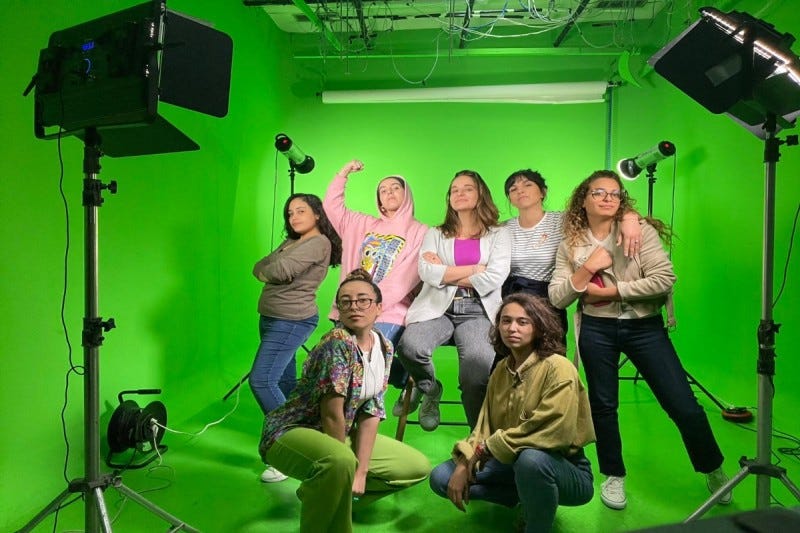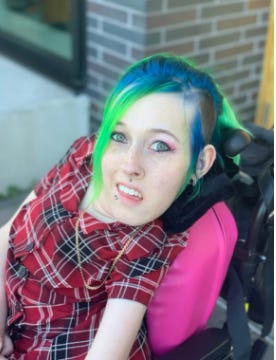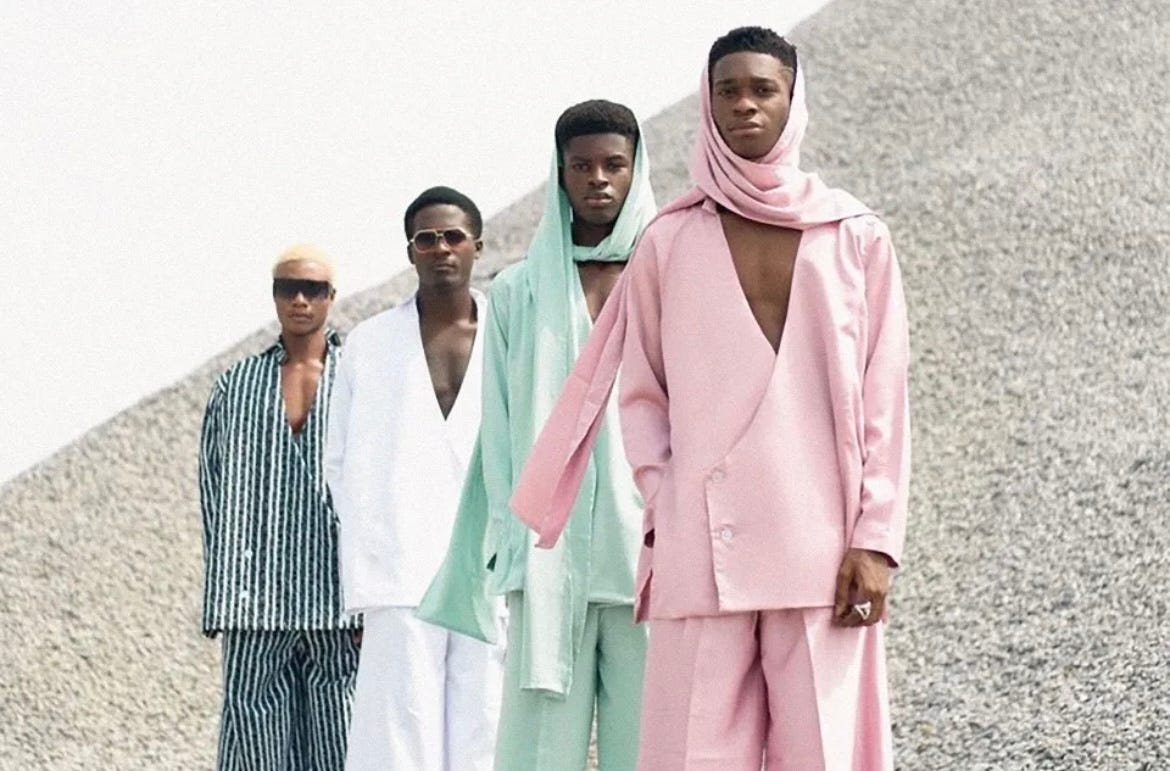Global Roundup: Polish and Ukrainian LGBTQ+ Pride, Morocco Feminist Digital Activism, Ghana LGBTQ+ Activist, Pride Accessibility for the Queer and Disabled, Nigeria Genderfluid Fashion Movement
Curated by FG contributor Samiha Hossain
WarsawPride and KyivPride united for a single, joyous Pride parade. (WOJTEK RADWANSKI/AFP via Getty Images) via Pink News
Thousands of protesters flooded the streets of Poland’s capital Warsaw for the Equality Parade, the largest queer event in central Europe. Joining them were 300 members and supporters of the embattled KyivPride, who were unable to gather in their own country because of the war. More than 11 LGBTQ+ organizations from across Ukraine joined in the parade. Equality Parade organizers hope to use the joint event to ensure Ukraine’s continued struggle for freedom from the Russian invasion remains in people’s minds.
We are grateful to Warsaw Pride…but it is very painful that our city is now under the threat of bombing. - Lenny Emson, KyivPride director
Emson told the crowd before the march that if Ukraine is seized by the Kremlin, the LGBTQ+ community will face untold harm. The invasion has all but silenced LGBTQ+ people trapped in occupied territories, he said. Many have retreated back inside the closet while trans people have stopped their hormone treatments in a desperate bid to stay safe.
For our community, it’s a huge thing. A huge chunk of our community is stuck in Ukraine because they have the gender marker ‘male’ in their passport, including trans people. They are with us and we are with them – and today we are marching for them. - Lenny Emson
Poland has emerged as a key ally of Ukraine, with more than 1.1 million people having fled to Poland since the beginning of the war on 24 February, the UN refugee agency, UNHCR, says. Warsaw Pride especially has become a lifeline for queer Ukrainians. Activists have scrambled to ensure trans people who have come across the border have access to gender-affirming healthcare and safe accommodations.
Credit: Meryem Ait Aghnia via Morocco World News
With the digital revolution paving the way for new forms of activism – cyberactivism – JATwJABT, a new Moroccan feminist media platform, aims to promote gender equality in Morocco by advocating for women’s rights, challenging gender biases, and encouraging women to speak up for themselves. The production company JAWJAB launched the JATwJABT platform last month, with the aim of shaping feminist issues and politics in Morocco. The platform connects activists, experts, public figures, and ordinary women to collect, display, and contextualize knowledge and practices to support the feminist struggle in Morocco.
The #MeToo movement in 2017 reached Morocco as well, causing the birth of a new form of activism on social media in the country. Movements such as #Masaktach (“I will not stay silent”), Moroccan Outlaws, and #MeTooUniv gained momentum in Morocco during this period.
Through JATwJABT, we want to liberate women’s words and speech, and most importantly listen to them. - Camelia Echchihab, JATwJABT’s co-founder and editorial director
Echchihab says they received a lot of positive messages and feedback when they launched JATwJABT. According to their press release, the platform’s two missions are to create a safe and open space for women to speak up and share their stories without judgment, and to foster feminist values that deconstruct sexist taboos and stereotypes which persist in Moroccan society. The platform produces diversified content, including videos, talk shows, documentaries, and short films. For World Menstrual Hygiene Day on May 28, JATwJABT released a short film called “Bla Mika,” meaning “without a plastic bag,” which tackles the stigma and taboos associated with menstruation in Morocco.
In an attempt to “democratize knowledge,” JATwJABT established its #Kelma segment, which features Moroccan female figures explaining feminist concepts such as “mansplaining” and “the male gaze.” Echchihab emphasizes that they adopt an intersectional approach and the platform is for everybody, including trans and queer people.
Men have to be included in the fight [for equality] and make an effort to recognize and acknowledge the privileges they have in society. They have to deconstruct these privileges. - Camelia Echchihab
Wisdom Kwame Bebli, an LGBTQ+ activist in Ghana, was interviewed as part of the United Nations video campaign, Diversity in Adversity, which highlights and celebrates queer human rights defenders and activists around the globe and shares the incredible work they do.
Wisdom started his work around health intervention programmes, as he saw that people were unaware of how to access healthcare in terms of their sexuality and sexual behaviour. He also describes how being openly queer makes the person’s families, friends and acquaintances targets for bigots.
You can’t be able to move around comfortably, because you get people moving away from you because you are tagged. - Wisdom Kwame Bebli
It is by no means easy to be an LGBTQ+ Human Rights Defender and activist in Ghana, where LGBTQ+ Human Rights organizations cannot fully operate openly. Wisdom worked as the executive director of Solace Initiative, an organization whose objectives are overcoming the stigmatization and vilification of LGBTQ+ people. Recently, he was involved in the campaign to release the Ho 21, a group of Ghanaian Human Rights Defenders who were arrested during a training workshop on LGBTQ+ related issues. He also participated in mobilizing the local and international community against the Ghana’s Proper Human Sexual Rights and Ghanaian Family Bill, 2021 – a law under Parliament’s discussion that would introduce wide-ranging restrictions on advocacy and rights related to sexual orientation and gender identity. Wisdom recognizes the impact of activism.
We’ve seen mainstream Human Rights organizations coming together to speak out against the Family Values Bill which we have not seen in a very long time. - Wisdom Kwame Bebli
Wisdom does not think that equal rights will be achieved anytime soon, but he believes future generations will see it.
I will not be alive to see the light at the end of the tunnel, but to see people continue the work where we’ve left off, and to see the work we have done continue, is one of the things I’ll be happy about. - Wisdom Kwame Bebli
via CBC
Karli Drew is a queer and disabled activist in Edmonton, Canada who wrote about how Pride is not accessible for her. Drew was born with a relatively rare and visible neuromuscular disability — spinal muscular atrophy (SMA). From a young age, she was aware she was marginalized.
Needless to say, my disabled identity fundamentally shaped who I am and how I interact with the world. I learned to self-advocate and accept my disability at a young age. - Karli Drew
When she was a teenager, she realized she was queer, which she says was “a lot for [her] to process.” Drew did not encounter another queer and disabled person until she was an adult.
For years, I convinced myself I couldn't possibly be both at the same time so I repressed my queer identity. I was already aware there were broad misconceptions about disability and intimate relationships, and I didn't think I had it in me to dismantle two stereotypes at once. - Karli Drew
Drew discusses how her accessibility needs are ignored at Pride events. She has never been able to attend any Pride events with or without her queer friends. Many events have seating areas that are not wheelchair accessible, adequate shade, food and water are not guaranteed, and there is a lack of accessible washrooms or spaces for people who become overstimulated. Furthermore, this year, the lack of COVID-19 protections make it less accessible for her than ever.
However, Drew has been able to find spaces accessible to her with social media. The queer, disabled people she has met online all over the world share the same barriers with accessibility.
Words can't describe the relief I felt discovering the unapologetic diversity within the disabled community, including those with identities matching my own. I connected with other queer, disabled people who intimately understood the nuanced struggles and celebrations — such as the added barriers to coming out when disabled or finding doctors who are both queer-friendly and anti-ableist. - Karli Drew
Despite the challenges, Drew believes in the importance of Pride Month and an accessible future with accessible Pride events and year-round accessible queer spaces, including sensory-friendly ones. She advocates for actively recruiting queer, disabled consultants as Pride event organizers as well as following a variety of queer, disabled activists to learn what is being done right, and what is being done wrong. She also emphasizes amplifying queer, disabled voices and acknowledging queer, disabled existence.
Manuel Tobi via them.us
Several Nigerian designers are using their labels to refute traditional views of gender and sexuality, all while making beautiful clothing to boot. I’ll be sharing three of these revolutionary designers here.
Emerie Udiahgebi, a 25-year-old nonbinary designer, has released a new collection for their eponymous genderless clothing brand. The collection “Animalia” offered space for queer and trans models to sashay down the runway wearing clothes specifically built for them. The designer’s creations found perfect homes on the bodies of trans and gender-nonconforming models, including Babatunde Tribe, whose appearance in loosely-fitting floor length mesh pants reflected a pivotal moment in their career. Tribe had quit walking Nigerian runways because they were too often kept from dressing in alignment with their identity. But at Udiahgebi’s presentation, they could be exactly who they are.
That was my first time walking a show as a non-binary person. And I felt like a god. I felt that power of diversity. - Babatunde Tribe
Trans designer Fola Francis’ eponymous label offers functional ready-to-wear pieces ranging from colorful t-shirts and tracksuits to loungewear and pajamas. For Francis, the label is about more than just gender-neutral, expertly crafted basics. During the #ENDSARS protests, in which queer Nigerians led a nationwide uprising against police brutality, Francis supported the cause by making mesh t-shirts that proclaimed “Queer Lives Matter” and distributing them to influential organizers.
I honestly built this brand as a form of therapy, as a way to do something positive for myself. I built the brand to serve everyone. - Fola Francis
Jordyn Lolu Vangei knows the typical frustrations of shopping as a trans or gender-nonconforming person: when the sting of gendered sections doesn’t get you, there’s always the irritation of limited sizing options. These hurdles are why the transmasculine designer created their eponymous label, which seeks to ensure trans people can find clothes that respect the nuances of their bodies. What makes Vangei especially unique is the label’s focus on custom orders, which allows the brand to welcome consumers into the creative process while minimizing waste.
When genderqueer designer Taofeeq Abólárìnwá Yahaya launched Bola Yahaya in 2015, their goal was to create sustainable garments that drew inspiration from traditional African culture. Since then, they have won the fashion category of Dare2Dream, an annual competition show for Nigerian creatives. Yahaya’s brand has played a key role in contributing to the larger world of Nigerian fashion, helping establish the heralded Kwara Fashion Week.
[My label] reinterprets rich Nigerian style heritage into contemporary glamorous zero waste garments… [that] explore culture, sex, femininity, and most importantly, encourage body positivity. - Taofeeq Abólárìnwá Yahaya
Samiha Hossain (she/her) is a student at the University of Ottawa. She has experience working with survivors of sexual violence in her community, as well as conducting research on gender-based violence. A lot of her time is spent learning about and critically engaging with intersectional feminism, transformative justice and disability justice.
Samiha firmly believes in the power of connecting with people and listening to their stories to create solidarity and heal as a community. She refuses to let anyone thwart her imagination when it comes to envisioning a radically different future full of care webs, nurturance and collective liberation.







